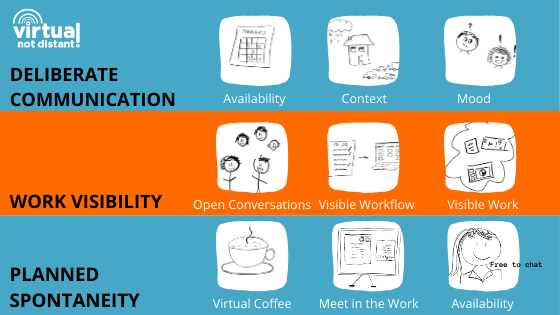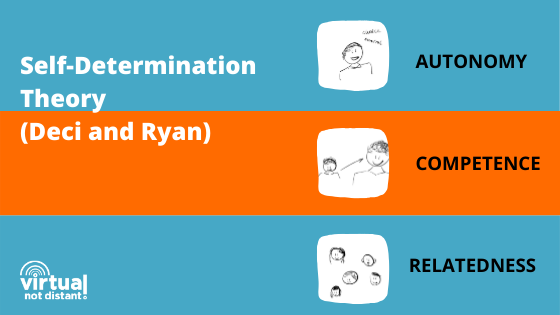How Remote Collaboration can Affect Motivation
I have a confession to make.
The bit that interests me most about enabling online collaboration is not the “online” bit. It's the collaboration aspect.
I started to work as a leadership trainer and away-day facilitator more than a decade ago, when I discovered that some of the exercises I was using to build theatre ensembles could be used as facilitation tools, to get people talking about how they were working in organisational teams.
To do that as well as possible and to educate myself on what was going on in organisations, I took plenty of courses and read many books. I looked at management and leadership theory, perused the research on team dynamics, and enjoyed the cross-over with psychology.
Even now, working in an area that is still lacking in evidence-based practice and where we’re still all working it out as we go along (I’m talking about the practice of leading in working in remote teams, as they exist now), I still draw as much as possible from classic theories, and see how they can help us improve our new ways of working.
Finding Common Ground
Trying to come up with a way of helping managers lead all kinds of teams (fully distributed, hybrid, clustered, mobile, in the private sector, in the public sector, with homeworkers, with freelancers, you get the picture…) I decided to define a set of high-level concepts, instead of recommendations.
The concepts of visible teamwork can be used as a guide to identify what’s missing in your communication and guide you to coming up with your own solutions, usually involving identifying a tool that can help with designing and agreeing a process, and role-modelling a new behaviour.
Of course I want to encourage people to try new ways of working when their context changes, but I always remind managers that in doing so, they might be affecting the motivation of their team members. And to raise our awareness of how this can happen, we need to understand motivation.
Where Does Motivation Come From?
There’s a question that often comes up when managers think of making the transition to office-optional or “remote”.
“How can I motivate my remote team, when I won’t be seeing them regularly?”
That’s the wrong question to ask. A much better one is:
“How can I help my team members stay motivated, within this new work environment?”
And it’s a question that can be answered using Self-Determination Theory as a guide.
I’ve stuck with Self-Determination Theory over many others, because it fits in with my belief that most people want to do a good job, and that most people want to be successful at work.
Arising from the positive psychology movement, Self-Determination Theory proposes that individuals are motivated to do a good job when they feel some sense of
Autonomy (they have some choice over what they work on, how they work on it, when or where the work on it),
Competence (they either feel like they master a skill or they are learning)
Relatedness (they feel a sense of connection to other people or to the purpose of their work).
Some of you might have read Daniel Pink's ‘Drive’ where he gave his own spin to Self-Determination Theory, replacing ‘competence’, with ‘mastery’ and ‘relatedness’ with ‘purpose’ (he obviously felt a sense of autonomy to do so!). I prefer the “competence” label as “mastery” suggests that we have to be amazing at what we do to be fueled to do it. I also think that “purpose” is a very loaded word and I know that there are people who don't find much purpose in their work, but the sense of connection with those around them is enough to motivate them to give their best.
The Missing (or not that salient) Link
So, why isn’t everyone highly motivated at work?
Because their environment and context can get in the way… And when shifting to remote work, it’s not enough to give people the flexibility to work from home, or to set up a “virtual watercooler”. We need to create an ecosystem of tools, processes and behaviours that enable us to continue feeling a sense of autonomy, competence and relatedness.
It’s not enough to adopt the principles of visible teamwork, we need to consider how much our own intrinsic motivation and that of our team members could be affected by them.
For example, adopting the principle of “Visible Workflow” by keeping a Kanban-style board with the number and progress of our tasks visible, can do wonders for our sense of competence - if it helps us identify the people who have information we need, and stops us from duplicating work.
However, it could potentially decrease how competent we feel, if we see that others are completing their tasks faster than we are… The psychological diversity in how we approach collaboration is huge, and at the very least we need to be aware of it.
Even adopting a flexible approach to teamwork, where people work away from each other and control their own schedules, can have unexpected consequences on people’s motivation. Yes, it’s great that we can all work at the times when we work best. I might be someone who likes to work early in the mornings from the co-working space and late in the afternoons from home. However, I might also need to talk things out in real-time. But if most of our communication is being done asynchronously, forcing me to do most of my communication in writing, that wonderful feeling of autonomy that came when choosing my own schedule might start to fade away…
With More Choice, Comes More Complexity
Understanding Self-Determination Theory is not going to automatically lead to a happier, more productive team, but it can certainly be a reminder that the new tools, processes and behaviour we adopt when shifting our collaboration to the online workspace can affect our motivation in the most subtle of ways.
Ironically, as we move towards a tech-enabled approach to collaboration, we need to keep reminding ourselves of the psychological diversity that exists in our team, especially as this might have gone unnoticed over many years of working in one way everyone felt comfortable with. When adopting the principles of Visible Teamwork, we should first assess how likely they are to affect our motivation.
Even introducing a simple tool like iDoneThis, where all you need is to write a few lines at the end of the day about what you’ve done, can reduce someone’s sense of autonomy (“Why do I have to report back to the team every day?”). It can also reduce your sense of competence or relatedness if other team members have a huge list of completed tasks, while all you can post is “Still working on that article…”
A Framework for Discussion
You don’t need to think through all of this on your own, in your head. Of course, here at Virtual not Distant we can help you through our coaching services and workshops, but why not first gather your team members and share this theory with them?
If you’re going to change how you work together, for example due to adopting online collaboration practices, how will your sense of autonomy, competence and relatedness be affected?
Or if you’re already operating as a remote team, is there anything you’re missing that could increase your motivation?
What could help you feel a higher sense of relatedness, for example? Or a higher sense of competence?
What aspects of visible teamwork would help you to address the different elements of Self-Determination Theory? (Everything is interrelated and more than one aspect is usually affected by any new practice, but sometimes it might help to think that Deliberate Communication can help with autonomy, Work Visibility with competence, and Planned Spontaneity with relatedness.)
Be specific in your answers. For example, saying that more trust would help you feel more competente, think about what that means. More trust, in others? Having others trust you to get on with the work? Be as specific as possible, so that you can design a way of working together that will work for you all.
And if you started reading this article because like many, you felt that your team needed motivating, before asking what you could be doing differently, think about what might have recently changed in your environment, in your context? Or even in one particular individual’s context. Could something have impacted negatively on their sense of autonomy, competence or relatedness?
While the tools we use to collaborate in the online space are continually evolving and updating, the basics of human behaviour and how we relate to our work and one another remain unchanged. Long-established theories of behavioural psychology can help us make sure our teams stay engaged, satisfied and productive.


